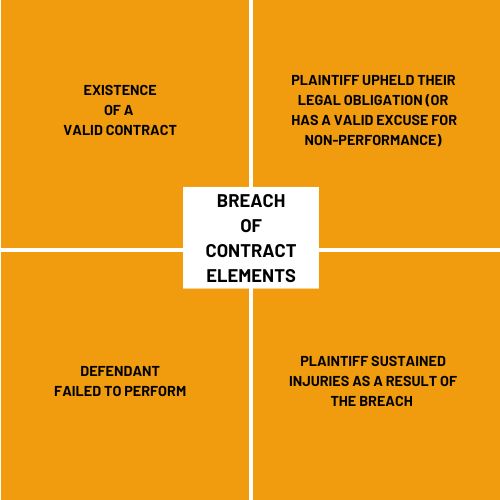
When someone fails to comply with the terms of a contract, you may have grounds to file a breach of contract claim.
These types of lawsuits are common in business litigation.
There are four elements of a breach of contract claim: a valid contract, performance, breach, and damages.
In this blog, we define each element of breach of contract in Texas, discuss potential defenses, and explain the damages you may recover.
At Massingill, our business litigation attorneys have the experience and skills to bring you a favorable result.
Contact us online or call 512-551-1514 to discuss your case, so we can build a winning litigation strategy for you.
What Are the Elements of a Breach of Contract Claim?

The party bringing the suit (the plaintiff) must successfully prove all four breach of contract claim elements. Let’s look at each element in detail. Additionally, it’s crucial to understand what are the four elements of breach of contract.
Existence of a Valid Contract
There must be a valid contract to enforce it. In Texas, a valid contract requires all of the following elements:
- An offer,
- Acceptance of the terms by both parties,
- Consideration (i.e., a bargained-for exchange of promises),
- A meeting of the minds as to the material terms, and
- Execution and delivery of the contract.
If even one element is missing, there are claims of fraud or duress, or the contract is for some illegal purpose, the contract is invalid.
Oral contracts are valid in Texas as long as they meet specific requirements.
Their validity is more difficult to prove, but an experienced business litigation attorney can help.
Plaintiff Upheld Their Legal Obligation (Or Has a Valid Excuse for Nonperformance)
The plaintiff must prove that they fulfilled their end of the bargain.
If the plaintiff didn’t perform their legal obligation under the contract, they must have a valid justification.
Defendant Failed to Perform
A defendant who doesn’t meet their contractual obligation is in breach.
There are two types of breach: minor or material. A minor breach is something that doesn’t stop the contract from being fulfilled.
A typical example is a delivery delay where the supplier can still perform their obligation, but it will be at a later date.
The plaintiff (or non-breaching party) must still pay what they owe on the contract even with the late delivery, but they may be able to recover damages caused by the delay.
A material breach is the most serious type. It occurs when the breaching party’s action or inaction renders the contract useless.
What was promised was not delivered. With a material breach, the plaintiff does not have to perform their contractual obligations, and they can seek damages.
Plaintiff Sustained Injuries As a Result of the Breach
You must show the court that you sustained actual damages from the defendant’s breach.
In other words, you need to show that you were harmed due to the other party not fulfilling their side of the contract.
What Defenses Are There for Breach of Contract?
There are situations where courts permit a party to breach.
First, if there was no valid contact to begin with, a court will likely dismiss a breach of contract claim.
Second, a court may void a contract if one of the parties entered into it based on misleading or misrepresented information.
Third, if uncontrollable circumstances make it impossible for a party to perform their obligation, a breach may be excused.
How Long Do You Have to File a Breach of Contract Claim?
In Texas, the deadline (or statute of limitations) to file a claim for breach of contract is four years.
The clock starts on the date of the breach.
If you don’t file your lawsuit within four years, you’re likely barred from bringing the claim. However, there are some exceptions.
For example, if you were not aware that the defendant was in breach, the statute of limitations doesn’t begin until the information was known or should have been known.
What Type of Recovery Is Available?
The goal of contract remedies is to compensate, or make whole, the non-breaching party rather than penalize the breaching party.
Texas courts want to put the plaintiff in the same position they would have been had the breaching party performed under the contract.
Thus, you may be entitled to the following types of damages:
- General damages—these are direct losses (e.g., reimbursement of costs),
- Special (or consequential) damages—these are damages that flow out of the breach (e.g., loss of profits), and
- Equitable Damages—this is non-financial compensation (e.g., specific performance or revision of the contract).
Texas law also permits the recovery of reasonable attorney fees.
Let Our Business Litigation Attorney Fight for You
At Massingill, our business litigation attorneys provide effective, strategic, and personal representation to our clients in Austin and across Texas.
Our lead litigation attorney, Jeff Johnson, is a seasoned litigator and former U.S. Army prisoner-of-war interrogator and linguist.
He has handled a wide variety of complex cases in both federal and state courts. With over 150 five-star reviews on Google, we continue to provide exemplary service.
Call our office at 512-551-1514 or contact us online for a free case evaluation.

